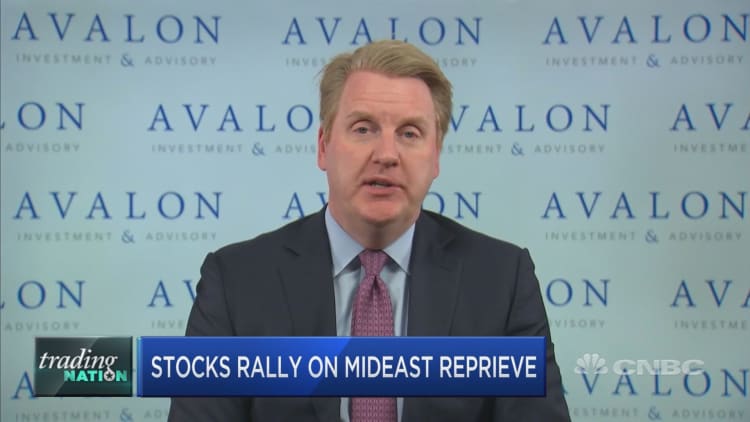
New year, new highs.
The start of 2020 has already been momentous for the S&P 500, which reached new records Wednesday following some momentary reprieve in the simmering conflict between the United States and Iran.
Tensions appeared to ease following an Iranian missile strike on U.S. targets in Iraq that served as retaliation for the United States' killing of Iranian Gen. Qasem Soleimani. The strike resulted in no U.S. casualties and was met with the threat of "punishing economic sanctions" from President Donald Trump.
U.S. markets have largely brushed off the conflict so far, encouraged by expectations that it won't escalate into a full-scale military entanglement. Part of that may be the muted historical impact that U.S.-Iran crises have had on domestic equities, which tend to bounce back not long after periods of tension with Iran.
That effect could very well play into the latest bull case posited by Bill Stone, chief investment officer and managing director at Avalon Investment & Advisory, who called the major averages' rally to new highs in November and oversees management of nearly $9 billion in assets.
"When you talk about any geopolitical event, it typically makes sense to not overreact to it," Stone said Wednesday on CNBC's "Trading Nation."
The United States' relatively newfound energy independence, which makes conflict in oil-rich regions less of a risk to U.S. markets, should help stocks along in the new year, Stone said.
Stone's target for the S&P this year is 3,675, the highest on Wall Street. That implies a roughly 13% rise from where the index closed on Wednesday.
In addition to what the money manager expected to be a 5-7% reacceleration in corporate earnings in 2020, "I do think you're going to probably have less … time during this year where you're going to be worried about U.S. recession," he said.
"I think that's another part that adds to, I'd say, the positive narrative, because I think the rest of the globe has probably bottomed out a bit," Stone said. "So, it's going to act as, actually, a tailwind instead of the headwind that we saw in 2019."
The presidential elections also shouldn't sway markets as much as some may expect, Stone said. He pointed to a surprising trend he noticed when reviewing how much markets tend to fall during election years: They don't tend to decline more than in the average nonelection year.
"Interestingly enough, the intrayear declines in election years have tended to be actually slightly less than you've seen [in] the market overall," he said, citing data from his firm and Strategas.
"I will say you probably should expect a little bit more volatility this year, in one sense, than last year, because we really had very low intrayear volatility last year," he said. "But ... election years, even though people might say, 'Oh, that's worrisome,' [have] historically not been a big deal. It's been other issues. If it's been a bad election year, it's because the economy was caving in or something like that, not really the election."
All in all, with the U.S. and Iran at bay for the time being, elections not a major threat to stocks, corporate earnings set to bounce back and the Federal Reserve's monetary policy moves largely out of the way, Stone was encouraged by the early-year setup and said a balanced investing approach makes sense for buyers.
"We've talked at times about value. We still think you should have some value exposure ... [and] don't be all-out in growth. Have a mix of the two," he said, adding that his firm is overweight industrials for value and technology for growth.
Stocks settled higher on Wednesday, with the Nasdaq reaching a new closing high.






